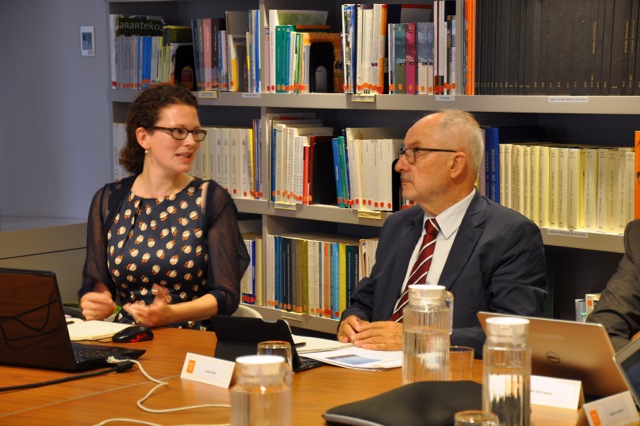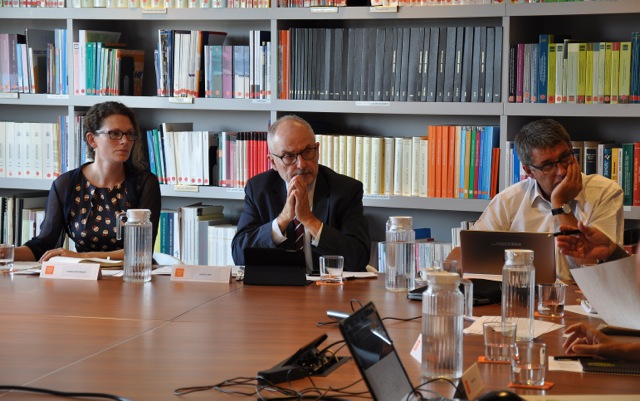Naomi Creutzfeldt (Associate Fellow) is funded by the Economic and Social Research Council from October 2013 - September 2016
Published PROJECT REPORT
UK report & individual ombudsman reports
UKAJI blog post
For Naomi's staff profile and up-to-date publication list, see here
The research objective of this project is to seek to compare levels of engagement and trust in ombudsman systems in France, Germany, and the United Kingdom. With that objective in mind, research questions will aim to elicit data that will show (1) what citizens expect from the ombudsman process, and to understand their level of engagement in the ombudsman complaints processes in each country; (2) demonstrate the extent to which ombudsmen explain their decisions and thereby engage in the process; (3) consider the role the individual ombudsman plays, measured by media profile and public exposure, in order to understand better the place and status of the ombudsman within society and understand the levels of engagement and trust by users as reflected in the media.

This research will improve understanding of how the ombudsman process is perceived by its users and positioned within society. The research objective will be achieved by collecting qualitative and quantitative data in a cross country and cross sector comparison.
The ombudsman landscape throughout EU member states presents a variety of institutional and jurisdictional arrangements, operational styles and decision-making processes. Although this poses some challenges in being able to conceptualise a unified ombudsman institution, it offers distinct advantages for the study of the relationship between decision-making practices on the part of the ombudsmen and perceptions of procedural justice and levels of trust on the part of users across different jurisdictions and cultures.
Despite the significance of ombudsmen to our constitutional and civil justice landscapes, very little is known about users’ perceptions of the fairness of the procedures and practices and the significance of these perceptions for levels of trust in particular ombudsman offices.

This project will fill this gap, providing important data and knowledge which will be directly relevant to the development of national policies and EU level multiple networks of policy-making.
Because the research addresses public attitudes to and use of ombudsmen, it will impact on and be pertinent to the public, to consumer groups, to ombudsmen and to policy makers to national and EU level. Academic debate will be encouraged to engage in collaboration with practitioners and representatives of the public. This is very important for countries such as Germany and France where private sector ombudsmen are not noticeably established yet.
To date, as part of the project, Naomi has spoken at a number of conferences including ones in Maastricht, Madrid, Vienna, the Socio-Legal Studies Association (SLSA) Conference in Aberdeen, and the Law and Society Association (LSA) Conference in Minneapolis. She also organised an ombudsman workshop at Oxford in April 2014. She is co-organising and speaking at the annual ADR conference at Oxford, which will be held in October this year. As well as speaking at more conferences in the future, Naomi will be holding a conference at the end of her project to bring together the results of her research. For a list of events, past and upcomming, please click the events tab.
The project has mainly involved collecting data by sending out surveys to users of ombudsmen, through the ombudsmen themselves. Within this first stage of acquiring data, Naomi has already noticed how interested the participating ombudsmen are in having this research done. She is receiving a high number of responses to her survey and it is evident that this research is greatly welcomed by both the ombudsmen community as well as users of ombudsmen. The next stage is to conduct in-depth interviews and a media-content analysis.
The process has been a very transparent one of collaboration between Naomi and the ombudsmen community. Naomi has been travelling frequently for this project in order to keep in constant contact with the ombudsmen and have discussions with them about the surveys that they send out to their users on her behalf. The project does not therefore only have importance in terms of academic theory, but it has had an impact in getting a dialogue going with the ombudsmen about user perceptions and their procedures.
Naomi is hoping not only to compare public and private sectors within each country itself, but to identify cultural patterns of dispute and settlement and analyse the differing legal cultures and attitudes in the three countries.




